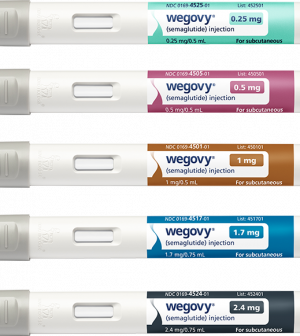- Could Your Grocery Store Meat Be Causing Recurring UTIs?
- Are You Making This Expensive Thermostat Error This Winter?
- Recognizing the Signs of Hypothyroidism
- 10 Strategies to Overcome Insomnia
- Could Artificial Sweeteners Be Aging the Brain Faster?
- Techniques for Soothing Your Nervous System
- Does the Water in Your House Smell Funny? Here’s Why
- Can a Daily Dose of Apple Cider Vinegar Actually Aid Weight Loss?
- 6 Health Beverages That Can Actually Spike Your Blood Sugar
- Treatment Options for Social Anxiety Disorder
Wegovy, Ozempic Lower Risk of Many Obesity-Related Cancers

In yet another finding that touts the health benefits of wildly popular weight-loss medications like Wegovy and Ozempic, scientists report that taking the drugs may help reduce the risk of some cancers.
In a study published July 5 in JAMA Network Open, researchers found people with type 2 diabetes who were being treated with a class of GLP-1 drugs were less likely to be diagnosed with 10 of 13 obesity-linked cancers than those who were taking insulin.
The reduction in risk was significant: Taking the medications cut rates of gallbladder cancer, meningioma, pancreatic cancer and hepatocellular carcinoma, a type of liver cancer, by more than half.
Risks were also reduced for cancers of the ovaries, colon, esophagus and kidneys as well as for multiple myeloma (a cancer of the bone marrow) and endometrial cancer (which begins in the lining of the uterus).
Excess weight can trigger chronic inflammation and high levels of insulin, insulin-like growth factor and sex hormones. All of these can prompt the development of cancer, according to the U.S. Centers for Disease Control and Prevention. GLP-1 medications interact with systems related to insulin production, the researchers noted.
Importantly, the study found that taking GLP-1 drugs did not lower the risk of postmenopausal breast cancer, which CDC data show is the most common obesity-linked cancer.
Risk was also not reduced for stomach cancer or thyroid cancer. Other early research has found that GLP-1s may interact with the body’s insulin production in ways that may harm the thyroid, CNN reported, and the study noted that patients should be aware of thyroid-related risks that are included in the medication’s packaging.
The researchers also found the risk of cancer for people with type 2 diabetes was not different among those who were treated with GLP-1s compared with those where were being treated with metformin. Kidney cancer risk was higher among those using GLP-1s, however.
In the study, researchers from the Case Western Reserve University School of Medicine and the MetroHealth System analyzed more than a decade of medical records on nearly 1.7 million people with type 2 diabetes.
While more research is needed, the findings provide “preliminary evidence of the potential benefit of GLP-1RAs for cancer prevention in high-risk populations and support further preclinical and clinical studies,” the authors wrote.
More information
Drugs.com has more on weight-loss drugs.
SOURCES: JAMA Network Open, July 5, 2024; CNN
Source: HealthDay
Copyright © 2026 HealthDay. All rights reserved.










